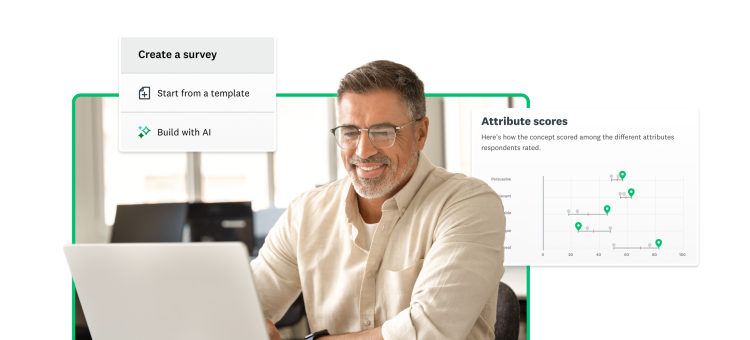Decision-making gets difficult when you don’t know what the impact of your decision could be and you can only rely on your intuition or the opinions of those around you as guides.
Fortunately, it doesn’t have to be that way—especially if we’re talking about business decisions, career moves, and other potentially life-changing dilemmas. Getting your own data—hard facts instead of just opinions and intuition—can help you chart the right course in any and all of those scenarios.
And the good news is that you can get that kind of data easily by doing a little bit of research through an online survey panel.
What is a survey panel?
A survey panel, like our own SurveyMonkey Audience, is a solution that helps you get survey responses from the exact groups of people you want to listen to. To put it even more simply, a survey panel is a platform that can send your survey to a large number of survey respondents and where you can select the types of people you want responses from.
On a survey panel—also known as consumer panel or market research panel—you can target your survey to very specific groups. You can find survey participants by:
- demographic criteria, like age or education level
- geographic location
- socio-economic profile, including income level
- professional characteristics, like industry or level of hierarchy
This way, you’re sure that you’re getting feedback from the exact kind of survey takers you need to ask questions of.
And while big companies and innovative startups have market research teams (and budgets) to get this kind of data on a regular basis, independent professionals, small businesses, and even student researchers are also using panel research to get the hard facts that will help them make better data-driven decisions.
Curious to learn more?
Start from scratch with our step-by-step guide to market research.
Check out these examples of how panel research data can help you make decisions to grow your business, advance your career, or make you stand out as a go-to person for impactful ideas.

A wedding chaplain fine-tunes his association speech with survey responses
Better known as Chaplain Dale, Dale Amundsen officiates weddings in Washington State. He was preparing for an important association speech, so he launched a survey about consumer behavior in his industry. The data he obtained was a hit. “It's a great way to get a survey out and obtain quick feedback, reaching people outside my own realm of influence,” he says. “The results were easy to quantify and include on a slide. Using SurveyMonkey Audience to get my own data makes me look well-researched when I give speeches.”

Graduating from university on a high note thanks to a survey panel
Using a survey panel helps you quickly gather feedback from many people, whether you’re interested in citizens' opinions about public affairs, consumers’ perceptions of certain brands, or the habits of specific groups of people. “It has helped me gather rich quantitative data which has really strengthened my dissertation,” says Mohammed Muaz Khan, a university graduate in the UK who did academic research on the Audience panel. “I ended up attaining a First for my dissertation, the highest grade on the undergraduate degree level.” Survey data for the win!

Family gym improves business plan with customer surveys
Proving that survey panels are not only for huge companies, Arlene Keeler, owner of Kaleidoscope Family Gym in Washington State, used a survey to identify her target market and put the finishing touches to her business idea. “Because I received the results so quickly,” she says, “I was able to move on in my business plan: The info was valuable in stating my potential customer base and target market, my price setting, and customer input.”

Solo entrepreneur uses feedback to create attractive marketing content
Joy Osaka-Lu recently launched her own business as a life coach in California. So she used a survey on our consumer panel to research and refine the niche into which she was launching herself. Through SurveyMonkey Audience, she obtained responses that helped her create marketing copy to attract more customers. “The platform,” she says, “is easy to use to reach specific demographics.”

Ad man creates high quality presentations to win clients
Mike Gillespie is the vice president of Client Services at Gillespie Group, a full-service ad agency in Philadelphia. He has launched surveys on a market research panel to obtain market intelligence, perform competitive analysis, and research brands and their perceptions, among other uses. By doing his own survey studies, he says, “I've been able to do professional, high-quality research for existing clients and new business presentations.”

Restaurant consultant asks what you’d like to eat... through surveys
Marketing executive Faith Bevard runs The Restaurant Solutionist, offering coaching and consultancy services to restaurant brands. She uses surveys for everything from testing marketing campaigns to pricing research... to validating new recipe ideas! She explains: “I love that we can reach a group of people quickly, screen them to make sure they're not brand rejectors, ask them questions, and read responses in days—or sometimes even hours—for considerably less than traditional research.”

Beauty products startup answers a burning question in hours
Jaleh Bisharat, a former tech executive, and Kimberly Shenk, a data scientist who previously served in the U.S. Air Force, got together to launch NakedPoppy, a clean beauty company with a tech-based approach. They have used our Audience survey panel to test marketing campaigns and product ideas, do consumer behavior research, and obtain competitive intelligence about their industry. Bisharat says they were amazed by the speed of our research panel: “We had a burning question and had results that changed our actions within 24 hours.”
As you can see, small businesses, professionals and individuals from many different fields are making decisions with data instead of just their instincts. And these data-driven decisions have the great advantage of having been tested and validated before they were implemented.
Sounds like a slam dunk, doesn’t it?
Of course, if you’ve never been involved in conducting market research dipping your toes in this field might seem daunting. So here’s a bit of help:
- an explanation of basic market research terminology that will help you quickly feel more confident about your knowledge
- our amazingly thorough and thoroughly amazing ultimate guide to market research, where you can learn the whole process step by step. (Be sure to bookmark it!)
And if you’d never heard about a survey panel before reading this story... well, you’re not alone. Here’s an extra example from our consumer survey.
Sa El, founder and CEO of Simply Insurance, an online digital insurance agency, used our SurveyMonkey Audience panel to study the insurance market and get feedback on consumer behavior and habits.
“The results came in 2 days and my audience was very mixed and a great sample,” he says. “I didn't know a service like this existed at first!”
Get your own data, make decisions easier. Learn how SurveyMonkey Audience works.



